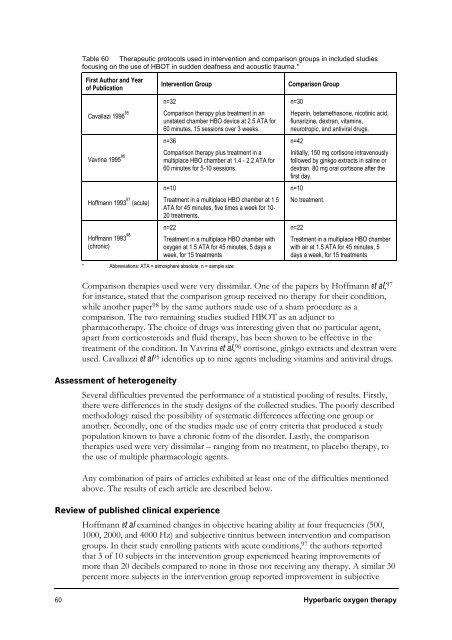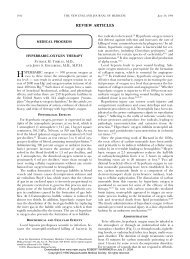Hyperbaric Oxygen Therapy - Hyperbaric Chamber Information ...
Hyperbaric Oxygen Therapy - Hyperbaric Chamber Information ...
Hyperbaric Oxygen Therapy - Hyperbaric Chamber Information ...
You also want an ePaper? Increase the reach of your titles
YUMPU automatically turns print PDFs into web optimized ePapers that Google loves.
Table 60 Therapeutic protocols used in intervention and comparison groups in included studies<br />
focusing on the use of HBOT in sudden deafness and acoustic trauma.*<br />
First Author and Year<br />
of Publication<br />
Cavallazi 1996 95<br />
Vavrina 1995 96<br />
Hoffmann 1993 97 (acute)<br />
Hoffmann 1993 98<br />
(chronic)<br />
Intervention Group Comparison Group<br />
n=32<br />
Comparison therapy plus treatment in an<br />
unstated chamber HBO device at 2.5 ATA for<br />
60 minutes, 15 sessions over 3 weeks.<br />
n=36<br />
Comparison therapy plus treatment in a<br />
multiplace HBO chamber at 1.4 - 2.2 ATA for<br />
60 minutes for 5-10 sessions.<br />
n=10<br />
Treatment in a multiplace HBO chamber at 1.5<br />
ATA for 45 minutes, five times a week for 10-<br />
20 treatments.<br />
n=22<br />
Treatment in a multiplace HBO chamber with<br />
oxygen at 1.5 ATA for 45 minutes, 5 days a<br />
week, for 15 treatments<br />
* Abbreviations: ATA = atmosphere absolute, n = sample size<br />
n=30<br />
Heparin, betamethasone, nicotinic acid,<br />
flunarizine, dextran, vitamins,<br />
neurotropic, and antiviral drugs.<br />
n=42<br />
Initially, 150 mg cortisone intravenously<br />
followed by ginkgo extracts in saline or<br />
dextran. 80 mg oral cortisone after the<br />
first day.<br />
n=10<br />
No treatment.<br />
n=22<br />
Treatment in a multiplace HBO chamber<br />
with air at 1.5 ATA for 45 minutes, 5<br />
days a week, for 15 treatments<br />
Comparison therapies used were very dissimilar. One of the papers by Hoffmann et al, 97<br />
for instance, stated that the comparison group received no therapy for their condition,<br />
while another paper 98 by the same authors made use of a sham procedure as a<br />
comparison. The two remaining studies studied HBOT as an adjunct to<br />
pharmacotherapy. The choice of drugs was interesting given that no particular agent,<br />
apart from corticosteroids and fluid therapy, has been shown to be effective in the<br />
treatment of the condition. In Vavrina et al, 96 cortisone, ginkgo extracts and dextran were<br />
used. Cavallazzi et al 95 identifies up to nine agents including vitamins and antiviral drugs.<br />
Assessment of heterogeneity<br />
Several difficulties prevented the performance of a statistical pooling of results. Firstly,<br />
there were differences in the study designs of the collected studies. The poorly described<br />
methodology raised the possibility of systematic differences affecting one group or<br />
another. Secondly, one of the studies made use of entry criteria that produced a study<br />
population known to have a chronic form of the disorder. Lastly, the comparison<br />
therapies used were very dissimilar – ranging from no treatment, to placebo therapy, to<br />
the use of multiple pharmacologic agents.<br />
Any combination of pairs of articles exhibited at least one of the difficulties mentioned<br />
above. The results of each article are described below.<br />
Review of published clinical experience<br />
Hoffmann et al examined changes in objective hearing ability at four frequencies (500,<br />
1000, 2000, and 4000 Hz) and subjective tinnitus between intervention and comparison<br />
groups. In their study enrolling patients with acute conditions, 97 the authors reported<br />
that 3 of 10 subjects in the intervention group experienced hearing improvements of<br />
more than 20 decibels compared to none in those not receiving any therapy. A similar 30<br />
percent more subjects in the intervention group reported improvement in subjective<br />
60 <strong>Hyperbaric</strong> oxygen therapy



